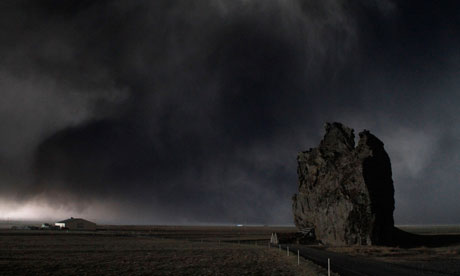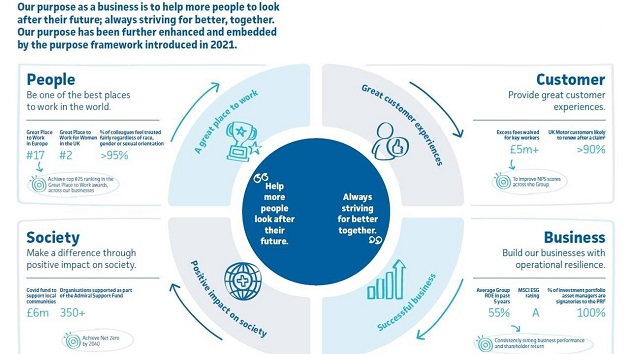
The UK could stand "at most a week" of disruption if a natural or man-made disaster struck before severe problems, economic and social, that would bring chaos to the country, according to a new report from the international affairs thinktank Chatham House.
The authors blame a complacent reliance on the globalised economy and the widespread adoption of "just-in-time" business models that stress lean, ultra-efficient operations with little slack built in for any unforeseen circumstances or stock held in reserve
With public services and businesses being run as if constantly in crisis mode, even in normal circumstances, there is little flexibility when a real crisis strikes.
The problem is compounded as national and local governments are underprepared for disasters, despite a growing range of intensifying threats and recent experiences around the world, from the Icelandic ash cloud to the nuclear crisis in Japan.
"Slow-motion" crises such as water shortages, resource scarcity and the impact of climate change also present a range of new difficulties that will put added strain on the public and private sectors, they say.
Beyond a one-week disruption, "costs can escalate rapidly once transport networks (or major production centres) are disrupted for more than a few days", according to the report, entitled "Preparing for high-impact, low-probability events", from the Royal Institute of International Affairs. As the economic impact is felt, vital infrastructure, from food and water supplies to energy and communications network, could fall under threat, it says.
Bernice Lee, lead author of the report, said: "The frequency of high-impact, low-probability events in the last decade signals the emergence of a new 'normal'. Apparent one-off high-profile crises such as 9/11, Hurricane Katrina, the Macondo oil spill and the Japanese earthquake and tsunami were all mega-disasters… marking the beginning of a crisis trend."
One way suggested by the report to help the public cope better with the impact of disasters is to make use of social media networks. Governments have largely ignored the rapid uptake of social media in planning for how to communicate with the public in the event of large-scale disaster, but the report found it could be a valuable tool as a "one-stop shop" for information and advice.
Today's report echoes the warnings of scientists, engineers and public utilities in the past few years over the UK's lack of preparedness even for predictable events, such as serious floods, droughts and storms.
Many of the world's fall-back systems are now stretched even in good times – for instance, food stocks and particularly grain stores globally have in recent years fallen to historically low levels under the impact of heightened demand and rising prices.
In the UK, these vulnerabilities are increased by the country's consumption habits and infrastructure. The UK is heavily dependent on imports of food and of energy. Britain's gas supplies in the North Sea are in rapid decline, but for the UK it is a key fuel, both for heating and for electricity generation, forcing far more to be imported. If these pipelines were disrupted, chaos would not be far away: despite pledges to build new gas storage infrastructure, there is often only a few days' worth of extra capacity stored within the system.
Petrol supplies too would be under threat after only a few days of disruption, and the vulnerability of transport networks means getting food and vital services to people affected by disasters becomes difficult very quickly. Even water supplies could be threatened in a prolonged disaster, as water storage networks are under strain and building new reservoirs – which utilities warn are needed – is extremely hard because of planning restrictions.
Lee also said that businesses should take a lead in building in greater resilience to their operations, even though this would mean moving away from "just-in-time" business models – meaning a hit to short-term profitability while companies adjust and built more slack into their systems.
Lee said: "Industries – especially high-value manufacturing – may need to reconsider their just-in-time business model in an interdependent world."
http://www.guardian.co.uk/world/2012/jan/06/just-in-time-business-model-disaster-risk
With public services and businesses being run as if constantly in crisis mode, even in normal circumstances, there is little flexibility when a real crisis strikes.
The problem is compounded as national and local governments are underprepared for disasters, despite a growing range of intensifying threats and recent experiences around the world, from the Icelandic ash cloud to the nuclear crisis in Japan.
"Slow-motion" crises such as water shortages, resource scarcity and the impact of climate change also present a range of new difficulties that will put added strain on the public and private sectors, they say.
Beyond a one-week disruption, "costs can escalate rapidly once transport networks (or major production centres) are disrupted for more than a few days", according to the report, entitled "Preparing for high-impact, low-probability events", from the Royal Institute of International Affairs. As the economic impact is felt, vital infrastructure, from food and water supplies to energy and communications network, could fall under threat, it says.
Bernice Lee, lead author of the report, said: "The frequency of high-impact, low-probability events in the last decade signals the emergence of a new 'normal'. Apparent one-off high-profile crises such as 9/11, Hurricane Katrina, the Macondo oil spill and the Japanese earthquake and tsunami were all mega-disasters… marking the beginning of a crisis trend."
One way suggested by the report to help the public cope better with the impact of disasters is to make use of social media networks. Governments have largely ignored the rapid uptake of social media in planning for how to communicate with the public in the event of large-scale disaster, but the report found it could be a valuable tool as a "one-stop shop" for information and advice.
Today's report echoes the warnings of scientists, engineers and public utilities in the past few years over the UK's lack of preparedness even for predictable events, such as serious floods, droughts and storms.
Many of the world's fall-back systems are now stretched even in good times – for instance, food stocks and particularly grain stores globally have in recent years fallen to historically low levels under the impact of heightened demand and rising prices.
In the UK, these vulnerabilities are increased by the country's consumption habits and infrastructure. The UK is heavily dependent on imports of food and of energy. Britain's gas supplies in the North Sea are in rapid decline, but for the UK it is a key fuel, both for heating and for electricity generation, forcing far more to be imported. If these pipelines were disrupted, chaos would not be far away: despite pledges to build new gas storage infrastructure, there is often only a few days' worth of extra capacity stored within the system.
Petrol supplies too would be under threat after only a few days of disruption, and the vulnerability of transport networks means getting food and vital services to people affected by disasters becomes difficult very quickly. Even water supplies could be threatened in a prolonged disaster, as water storage networks are under strain and building new reservoirs – which utilities warn are needed – is extremely hard because of planning restrictions.
Lee also said that businesses should take a lead in building in greater resilience to their operations, even though this would mean moving away from "just-in-time" business models – meaning a hit to short-term profitability while companies adjust and built more slack into their systems.
Lee said: "Industries – especially high-value manufacturing – may need to reconsider their just-in-time business model in an interdependent world."
http://www.guardian.co.uk/world/2012/jan/06/just-in-time-business-model-disaster-risk




































































































![[Most Recent Quotes from www.kitco.com]](http://www.kitconet.com/charts/metals/gold/t24_au_en_usoz_2.gif)
![[Most Recent Quotes from www.kitco.com]](http://www.kitconet.com/charts/metals/silver/t24_ag_en_usoz_2.gif)
![[Most Recent Quotes from www.kitco.com]](http://www.kitconet.com/charts/metals/gold/t24_au_en_bpoz_2.gif)
![[Most Recent Quotes from www.kitco.com]](http://www.kitconet.com/charts/metals/silver/t24_ag_en_bpoz_2.gif)
No comments:
Post a Comment